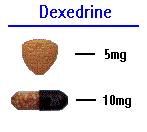| iPsychology
|
|
Dextroamphetamine Dextroamphetamine ( Dexedrine ) is a amphetamine used to treat narcolepsy and attention-deficit-disorder in children. In some cases this drug has been used to treat depression or as an adjunct in the treatment of exogenous obesity. This drug is from a family of drugs known as central nervous system stimulants. Do not give this drug to child that suffer from psychotic disorders that produce the symptoms of attention-deficit-disorder.
Strengths:
Normal dosage: ( Take last daily dose at least 6 hours before bedtime ).
Problems with:
Test:
Take With: With food. Full Benefits In: In one or more days. Missed Dose(s): If within one hour take,if over an hour skip and then continue on your normal schedule. If Stop Taking: Do not stop without consulting your physician and never abruptly. Overdose symptoms include: Coma,confusion, convulsions, cramps, diarrhea, fever,hallucinations,high / low blood pressure,irregular, loss of consciousness, nausea, panic, rapid heartbeat, tremors, or vomiting. Warnings Do not take monoamine oxidase inhibitor with this drug. Check with physician if taking any of the following:
The habit-forming potential is high. Psychological and physical dependence is possible. Addiction is rare in children but a problem with adults. Children who take this drug on a long-term basis should be examined every four to six months.The physician should monitor height and weight, look for the presence of tics, measure blood pressure and pulse, and ask about side effects. ( Yudofsky, Hales & Ferguson ) Do not take this drug if you are pregnant or if planning to become pregnant.Do not take if you are breast-feeding. Do not give this drug to children under the age of three and if over sixty with close monitoring. Do not drink alcohol while taking this drug. Do not use if:You had negative reactions to this or any other amphetamine in the past. If you have a history of drug alcohol abuse. If you have a psychotic disorder of any type. Inform your Doctor if:
Dextroamphetamine ( Symptoms or Effects ) Common: Nausea, diarrhea, loss of appetite, difficulty sleeping, restlessness, or weight loss. Rare: Abdominal pain, headache, drowsiness, dizziness, mood changes, lack of coordination,tics / unusual movements, irritability / nervousness, skin rash, hives, blurred vision, sexual problems, or paranoia. See physician always: Abdominal pain, headache, weight loss, mood changes, lack of coordination,tics / unusual movements, irritability / nervousness,skin rash, hives, blurred vision, sexual problems, or paranoia. See physician if severe: Nausea, diarrhea, loss of appetite, difficulty sleeping, drowsiness, dizziness, or restlessness. Stop taking and see physician NOW: Abdominal pain, headache, lack of coordination, tics / unusual movements, skin rash, hives, or paranoia. |

